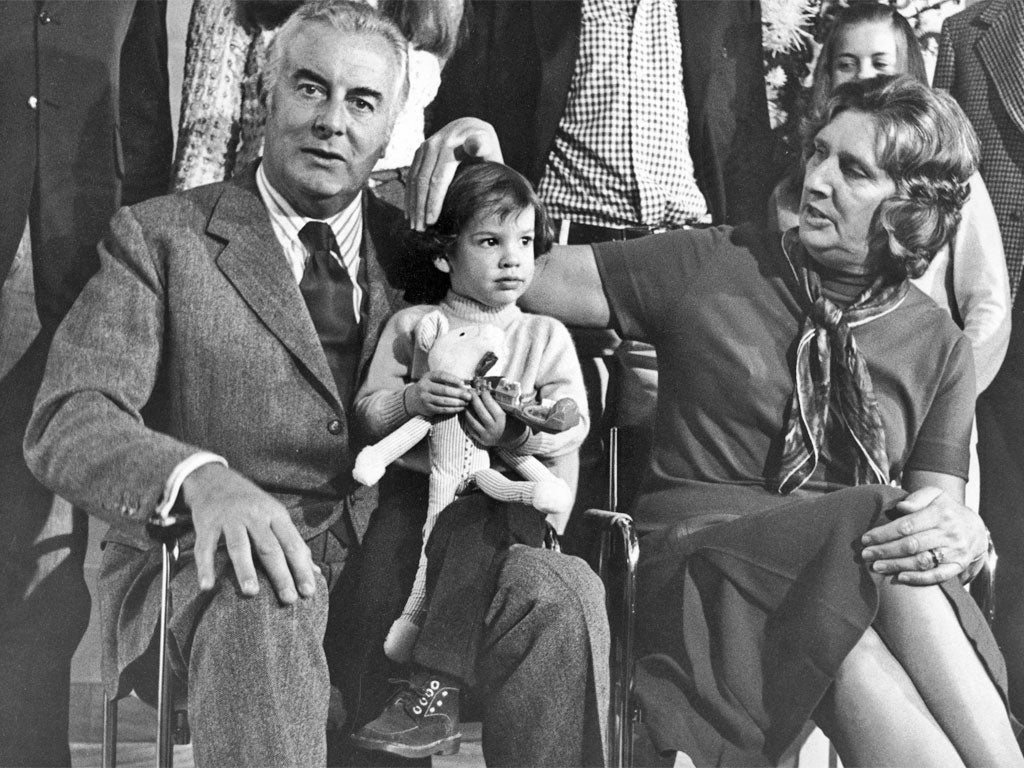Margaret Whitlam: Social campaigner and First Lady of Australia

Your support helps us to tell the story
From reproductive rights to climate change to Big Tech, The Independent is on the ground when the story is developing. Whether it's investigating the financials of Elon Musk's pro-Trump PAC or producing our latest documentary, 'The A Word', which shines a light on the American women fighting for reproductive rights, we know how important it is to parse out the facts from the messaging.
At such a critical moment in US history, we need reporters on the ground. Your donation allows us to keep sending journalists to speak to both sides of the story.
The Independent is trusted by Americans across the entire political spectrum. And unlike many other quality news outlets, we choose not to lock Americans out of our reporting and analysis with paywalls. We believe quality journalism should be available to everyone, paid for by those who can afford it.
Your support makes all the difference.When Margaret Whitlam heard in 1975 that her husband, Gough, had been dismissed as Australian prime minister, her response was characteristically blunt. "Why didn't you just tear it up?" she asked, referring to the document he had been handed by the Governor-General, Sir John Kerr.
That no-nonsense approach was one of the qualities that marked Whitlam out as much more than a prime minister's wife. Generous and gregarious, witty and down to earth, she was never afraid to speak her mind nor to forge her own path. A loyal consort and confidante, she was also a passionate advocate of social reform and a trailblazer for women's rights who broke the First Lady mould.
The affection in which she was held was demonstrated by the turn-out at her memorial service in Sydney, where a Who's Who of Australian politics and public life from the past 50 years assembled to pay final respects, and to shed a tear. At the front of the church sat a bowed figure in a wheelchair: 95-year-old Gough, the Australian Labor Party patriarch, mourning the woman he called "the love of my life". Theirs was a partnership of equals. The couple would soon have celebrated 70 years of marriage.
Although from a middle-class Sydney family, Margaret Elaine Dovey was a committed Labor supporter when she met Gough at a party in 1939. They had something else in common: she was 6ft 2in; he was two inches taller. "He was quite the most delicious thing I'd ever seen," she recalled later. Her father Bill was a lawyer, later a Supreme Court judge, her mother Mary an indefatigable community worker. Margaret grew up in Bondi and became a swimmer, winning the Australian breaststroke championships and competing in the 1938 Empire Games. She and Gough met while at the University of Sydney.
Margaret worked as a social worker and brought up their four children. In 1967 Gough, who had been a Federal MP since 1952, was elected Labor leader. In 1972, after 23 years in opposition, Labor came to power on a wave of enthusiasm for wide-ranging reform.
As First Lady Margaret was "vivid, independent and entirely herself", the current Prime Minister, Julia Gillard, observed following her death. She wrote a magazine column, was a regular guest on radio and TV, and even briefly hosted her own TV chat show. She led the Australian delegation to a UN conference on women and entertained Germaine Greer at the Lodge, the prime ministerial residence in Canberra.
Accompanying Gough on a state visit to London, Margaret was so popular that she held her own press conference. The Daily Mail wrote: "The Aussies have obviously got themselves a great big bloody beaut of a first lady." Back home, she argued for equal pay for women, abortion law reform, childcare and adult education. "I couldn't be an adornment ... [content to] float around opening and closing things," she declared. Her common touch and easy manner endeared her to Australians. "She was equally at ease munching a sausage at a Labor fund-raiser as she was dining at Buckingham Palace," one commentator, Mike Carlton, wrote recently.
In November 1975, amid rising inflation and unemployment, and following a series of scandals, the conservative-dominated Senate blocked legislation authorising government spending. With the country effectively at a standstill, Kerr took the unprecedented step of sacking Whitlam and installing the opposition leader, Malcolm Fraser, as prime minister. It was the most tumultuous time in Australia's modern political history. Margaret "just couldn't believe the whole thing". A month later, Fraser – the Whitlams' sworn enemy – won a general election. Margaret left a welcome letter in the Lodge for Fraser's wife, Tamie. Gough and Fraser later became good friends, unified by their progressive views.
Gough resigned the Labor leadership in 1977 and quit parliament the next year. However, he and Margaret continued to be active in public life. She became director of the Sydney Dance Company and chairman of the Opera Conference. She taught English to migrants, and modelled clothes for a large-size women's label. The couple spent three years in Paris in the mid-1980s, after Gough was appointed Australia's Unesco ambassador.
Into their 80s they were seen out and about in Sydney, especially at opening nights. In 2010 Gough moved into a nursing home but the couple met for coffee, or fish and chips by the beach. Margaret's death following a fall in February was mourned by many; she is survived by her husband, four children, five grandchildren and four great-grandchildren. Gough's friends fear he will not survive long without her.
Kathy Marks
Margaret Elaine Dovey, First Lady and social reformer: born Sydney 19 November 1919; Australian breaststroke champion 1937; first lady of Australia 1972-75; Order of Australia 1983; married 1942 Gough Whitlam (three sons, one daughter); died Sydney 17 March 2012.
Join our commenting forum
Join thought-provoking conversations, follow other Independent readers and see their replies
Comments